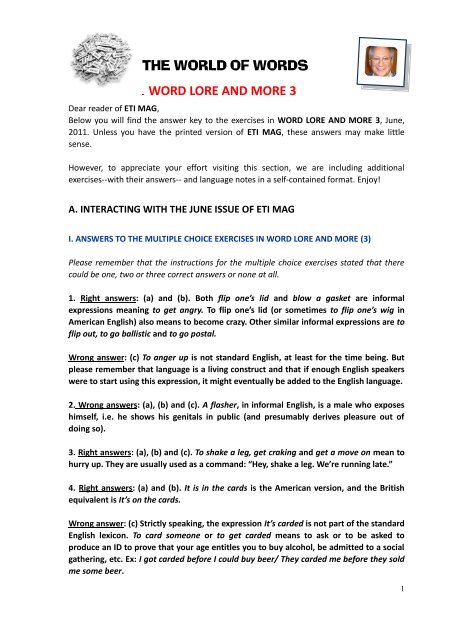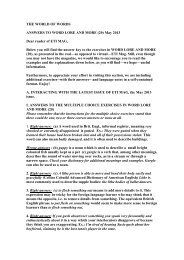THE WORLD OF WORDS - ETImag
THE WORLD OF WORDS - ETImag
THE WORLD OF WORDS - ETImag
You also want an ePaper? Increase the reach of your titles
YUMPU automatically turns print PDFs into web optimized ePapers that Google loves.
<strong>THE</strong> <strong>WORLD</strong> <strong>OF</strong> <strong>WORDS</strong><br />
WORD LORE AND MORE 3<br />
Dear reader of ETI MAG,<br />
Below you will find the answer key to the exercises in WORD LORE AND MORE 3, June,<br />
2011. Unless you have the printed version of ETI MAG, these answers may make little<br />
sense.<br />
However, to appreciate your effort visiting this section, we are including additional<br />
exercises--with their answers-- and language notes in a self-contained format. Enjoy!<br />
A. INTERACTING WITH <strong>THE</strong> JUNE ISSUE <strong>OF</strong> ETI MAG<br />
I. ANSWERS TO <strong>THE</strong> MULTIPLE CHOICE EXERCISES IN WORD LORE AND MORE (3)<br />
Please remember that the instructions for the multiple choice exercises stated that there<br />
could be one, two or three correct answers or none at all.<br />
1. Right answers: (a) and (b). Both flip one’s lid and blow a gasket are informal<br />
expressions meaning to get angry. To flip one’s lid (or sometimes to flip one’s wig in<br />
American English) also means to become crazy. Other similar informal expressions are to<br />
flip out, to go ballistic and to go postal.<br />
Wrong answer: (c) To anger up is not standard English, at least for the time being. But<br />
please remember that language is a living construct and that if enough English speakers<br />
were to start using this expression, it might eventually be added to the English language.<br />
2. Wrong answers: (a), (b) and (c). A flasher, in informal English, is a male who exposes<br />
himself, i.e. he shows his genitals in public (and presumably derives pleasure out of<br />
doing so).<br />
3. Right answers: (a), (b) and (c). To shake a leg, get craking and get a move on mean to<br />
hurry up. They are usually used as a command: “Hey, shake a leg. We’re running late.”<br />
4. Right answers: (a) and (b). It is in the cards is the American version, and the British<br />
equivalent is It’s on the cards.<br />
Wrong answer: (c) Strictly speaking, the expression It’s carded is not part of the standard<br />
English lexicon. To card someone or to get carded means to ask or to be asked to<br />
produce an ID to prove that your age entitles you to buy alcohol, be admitted to a social<br />
gathering, etc. Ex: I got carded before I could buy beer/ They carded me before they sold<br />
me some beer.<br />
1
5. Right answers: (a) and (b). If something is easy to do it’s a piece of cake or a cakewalk.<br />
Wrong answer: (c) a cakedance is just not part of the stand English lexicon (vocabulary).<br />
II. DID YOU KNOW?<br />
MORE ABOUT <strong>THE</strong> HIDDEN MEANING <strong>OF</strong> CERTAIN <strong>WORDS</strong><br />
In addition to come, as indicated in the magazine, other everyday words with a hidden<br />
meaning are box, which is used to refer to a woman’s genitalia, while basket makes<br />
reference to a man’s sexual organs, particularly as seen through tight clothes.<br />
There are several other words that belong in this category (sexual meanings) which we will<br />
be presenting from time to time in forthcoming issues.<br />
III. ANSWERS TO MATCH <strong>THE</strong> COLUMNS<br />
The idea behind this exercise was to test your knowledge of words which usually go<br />
together, as we explain below:<br />
1. slip---mind :<br />
If something slips your mind, your forget it. Ex: I’m sorry I did not phone you as I had<br />
promised. It completely slipped my mind.<br />
2. dash—hopes:<br />
Ex: Her decision to live abroad dashed my hopes of establishing a relationship with her,<br />
i.e. destroyed it, ruined it.<br />
3. touch—bargepole (British English)/ ten-foot pole (American English):<br />
The complete phrase is not to touch someone or something with a bargepòle/teen-foot<br />
pole. This is used as a warning for somebody not to go near somebody or something, or<br />
to become involved with somebody or in something because of the possible danger in<br />
doing so. Ex.: I hear your are planning to use LSD. It’s riskyh. I wouldn’t touch it with a<br />
ten-foot pole.<br />
4. dig---heels:<br />
To dig in your heels is to become obstinate, to refuse to change. Ex.: Our teacher dug in<br />
her heels and had us learn the poem by heart even though we begged her not to ask us<br />
to do that.<br />
5. keep—eye<br />
To keep an eye on something or somebody is to watch or take care of sth or sb. Ex:: Will<br />
you keep an eye on my stuff while I go to the restroom(at the airport, bus station, etc.)?<br />
2
B. ADDITIONAL EXERCISES FOR WHOEVER VISITS THIS WEB PAGE<br />
I. FUR<strong>THE</strong>R MULTIPLE CHOICE<br />
One, two, or all three choices may be correct, or none at all. The right answers are at the<br />
bottom of this article.<br />
1. If you are in a vulnerable/risky situation alone and without the explicit support of<br />
others you are out on a ..........<br />
a. prank b. ruse c. limb<br />
2. To trick or deceive someone, usually by confusing them is to ..................into doing<br />
someting.<br />
a. bamboozle b. befuddle c. begrudge<br />
II. DECIDE WHE<strong>THE</strong>R TRUE OR FALSE<br />
1. If something is off the charts you cannot get it, buy it or get hold of it any longer.<br />
2. To jump the gun is to use a gun unwisely, unnecessarily, etc.<br />
3. One of the meanings of to clock someone is to hit them.<br />
4. To swindle someone is to get something from them (usually money) through<br />
deception.<br />
5. To quibble is to argue about what might be regarded as unimportant matters or<br />
details.<br />
III. WHAT DOES <strong>THE</strong> EXPRESSION PECKING ORDER MEAN?<br />
Pecking order is the hierarchical order in an organization where some people are more<br />
powerful, have more rights and presumably more obligations than others. For instance,<br />
a boss is higher in the pecking order than an employee who has just joined a company.<br />
In turn, the owner of the company is higher up than the boss (unless he is the boss<br />
himself). The expression is apparently taken from what happens among fowl, where<br />
some birds peck those that are weaker than them and submit to being pecked by<br />
dominant, stronger birds.<br />
IV. AN INVITATION TO SUBMIT AN ANSWER AND WIN A PRIZE<br />
This issue’s answer is: What is it that has a silver lining?<br />
Those who send the right answer will receive a gift from TOOLS FOR TEACHERS. Email<br />
your answer to newtoolsforteachers@yahoo.com.ar<br />
3
V. ANSWERS TO FUR<strong>THE</strong>R MULTIPLE CHOICE<br />
1. Right answer: (c) limb<br />
Wrong answers: (a) and (b) A prank is a rather silly trick you play on someone just for<br />
fun. A ruse is a trick intended to deceive.<br />
2. Right answer: (a) bamboozle<br />
Wrong answers: (b) and (c). To befuddle is to confuse. This word is usually used as an<br />
adjective. Ex.: They looked befuddled after they listened to the lecture.<br />
To begrudge is (i.) to be annoyed that someone has something that you think they do<br />
not deserve. Ex.: To begrudge someone’s success. The other meaning (ii) is to feel<br />
unhappy or irritated that you have to do something. Ex.: Most commuters begrudge<br />
having to spend a lot of time in order to get to their jobs (or) ...the time they spend<br />
getting to their jobs.<br />
VI ANSWERS TO DECIDE WHE<strong>THE</strong>R TRUE OR FALSE<br />
1. False: something which is off the charts is exceptional, extraordinary. It is so good<br />
that it cannot be included in the regular charts (best sellers, etc.). This is a new<br />
expression which is similar to off the chain/hook/heezy, used mostly by teen agers in<br />
informal language.<br />
2. False: to jump the gun is to act prematurely without thinking about the<br />
consequences of your actions. Ex.: The pollsters jumped the gun when they<br />
announced Robertson as the winner of the election.<br />
3. True. Ex.: I didn’t like what he said to me so I clocked him.<br />
4. True: Ex.: I bought a TV set from a stranger who assured me it was brand new.<br />
Unfortunately, it soon went out of order and I realized I had been swindled.<br />
5. Right. Ex.: Let’s not quibble about whether we’ll meet at 8:00 or 8:15<br />
TIME TO SAY GOOD BYE<br />
We hope you enjoyed this section of ENGLISH TEACHING INTERACTIVE. Comments and<br />
suggestions are welcome. Send your email to newtoolsforteachers@yahoo.com.ar<br />
WORD LORE AND MORE is written by Oriel Villagarcia, a certified teacher from the<br />
Universidad Nacional de Tucuman. He holds a Master of Arts in linguistics for language<br />
4
teaching from the University of Lancaster, and has done graduate work at the Univeristy<br />
of Texas as a Fulbright Scholar. He was a member of the Advisory Panel for the first<br />
edition of the Macmillan English Dictionary for Advanced Learners. He runs advanced<br />
language workshops on idioms, informal/language and vulgar English. He can be<br />
contacted at newtoolsforteachers@yahoo.com.ar<br />
TOOLS FOR TEACHERS announces a workshop on FUN WITH SLANG: Over 100<br />
expressions fully contextualized to make them memorable and easy to remember.<br />
Date: Saturday, 25 June, 10:00 to 13:00<br />
At: SBS BARRIO NORTE, Avda. Cordoba 1840, Buenos Aires<br />
Fee: $58 or $54 (students)<br />
Reserve a seat by sending an email to newtoolsforteachers@yahoo.com.ar with your full<br />
name, phone numbers, and postal address<br />
-<br />
5



